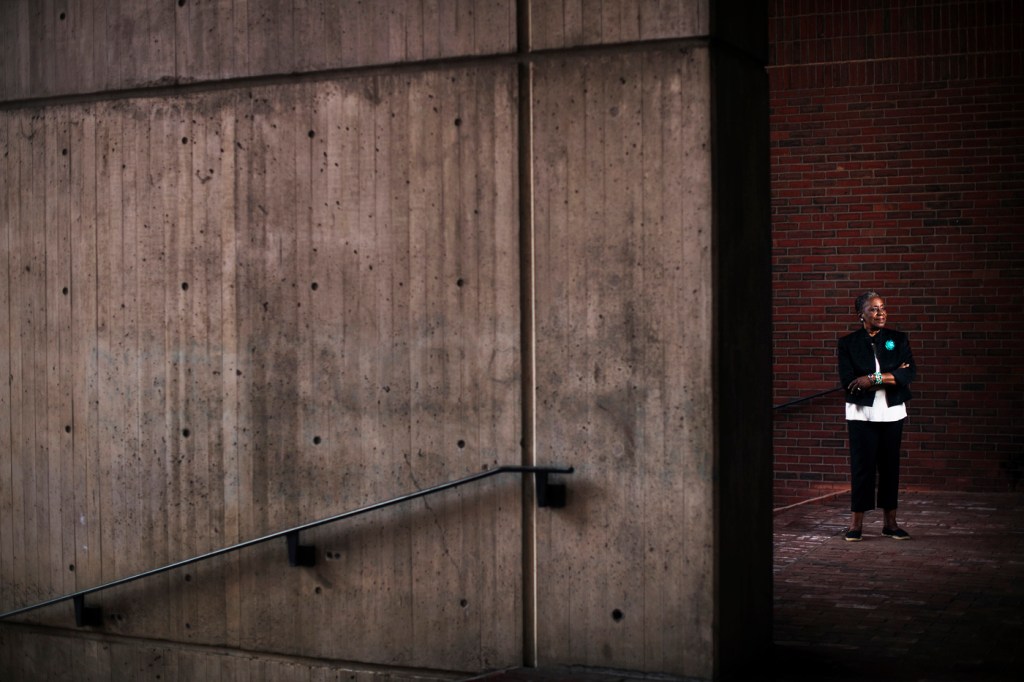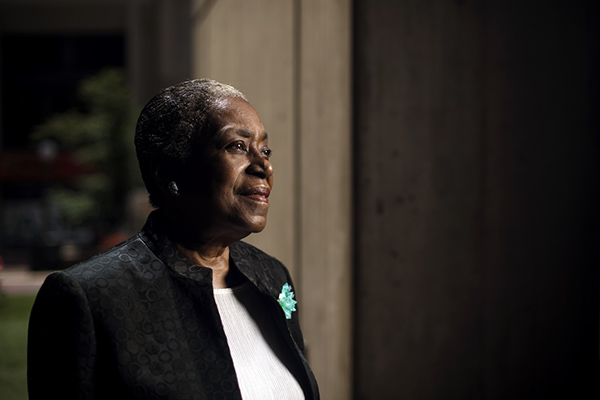Northeastern employee’s decades of activism recognized by City of Boston

Charlotte Mathews-Nelson describes her decades of activism with an air of inevitability. She grew up volunteering with the NAACP. She helped usher in equitable practices in the development of Boston’s Roxbury neighborhood. She reactivated the college chapter of the NAACP here at Northeastern. What else was there to do?
“What drove all this?” she said thoughtfully in her office in Northeastern’s Employer Relations department one recent July day. “Wanting to fix things that are not right.”
And as a black woman growing up in the segregated South of Dade County, Florida, there was a lot that was not right, to say the least. Mathews-Nelson recalled watching her mother, Gertrude Mathews, work the polls at voting time to ensure black people weren’t threatened out of voting. She remembers the exact moment she learned that her fifth-grade textbook was used by third-graders in the district’s white schools.
“I was taught right from wrong at a very young age. And I remember seeing things that were grossly wrong. I wanted to be a part of fixing that,” she said.
And so she has. The City of Boston recently recognized her “decades of service to the people of Boston and her commitment to racial justice and equity,” according to the resolution.
I thought I’d be a contemporary jazz singer. I just got sidetracked along the way.
Charlotte Mathews-Nelson, Employer relations coordinator
Mathews-Nelson began volunteering with the NAACP, the nation’s oldest civil rights organization, in the 1960s, moving north in the 1970s and serving in various administrative positions throughout several New England chapters. In the 1990s, Mathews-Nelson was elected the New England Area Conference president for five consecutive terms, overseeing NAACP branches in Maine, New Hampshire, Massachusetts, Rhode Island, and Vermont. She currently serves as an advisor to the organization.
In 1979, she started working at Northeastern, where she also earned her bachelor’s degree, and now serves as the employer relations coordinator. Closing in on 40 years with the university, Mathews-Nelson has served on several university-wide governing bodies, including the Commission on the Status of Women at Northeastern and the Affirmative Action Council, and she’s the former president of Northeastern’s Black Faculty and Staff Association.
Her activism doesn’t stop there. Mathews-Nelson has been deeply ingrained in fixing some of Boston’s inequity as well. She served on the Greater Boston Civil Rights Coalition, the Governor’s Hate Crime Commission, and the Attorney General’s Advisory Committee on Youth and Urban Violence. Currently, she’s a member of the Roxbury Strategic Master Plan Oversight Committee, a mayoral-appointed body that represents the needs of the Roxbury community in the development of seven parcels of public land.
The roster of Mathews-Nelson’s service goes on. Throughout all of it, though, she says her most gratifying work has come from working with youth.

In the early 1980s, Mathews-Nelson co-chaired the NAACP’s Afro-Academic, Cultural, Technological, and Scientific Olympics, a national program designed to recruit and foster high academic and cultural achievement among African-American high school students. The program culminates in competitions that test students’ academic and artistic prowess. Seeing its success elsewhere in the country, Mathews-Nelson brought ACT-SO to Boston.
“Touching young people’s lives in that way and being in their presence for a weekend [during competitions]—it was just wonderful,” Mathews-Nelson said. “It makes me smile now to think of some of the young people who’ve come through and still keep in touch,” she added, indeed smiling as she said it.
“Seeing the generations following mine pick up the gauntlet—that’s my motivation,” she said.
But this life—a life of community service and volunteer work and organizing and activism and standing up to injustice—isn’t what Mathews-Nelson always envisioned for herself.
“I thought I’d be a contemporary jazz singer,” she said, the smooth tenor of her voice backing it up. “I just got sidetracked along the way.”
For a moment, Mathews-Nelson was quiet, thinking, perhaps as we all do, about the unexpected turns our lives take.
Then: “I chose what I did because I had to serve,” she said. “And I don’t know if I could’ve gotten this satisfaction in another life.”





